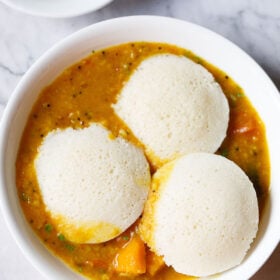When it comes to Street Food Recipes, there’s nothing really that can beat Indian cuisine. I really feel that we’ve got something for every palate on this planet, in our street food repertoire. One such marvel from the Mumbai streets is the Samosa Pav. In Maharashtra, especially in Mumbai, there’s a lot going on between pavs (dinner rolls). You can put a vada, bhajiya, anda (egg), samosa and more in it and turn it into a super scrumptious and filling meal. This post has the easiest way of assembling a yummy snack, when you’ve got some pav, samosa and chutneys at home.
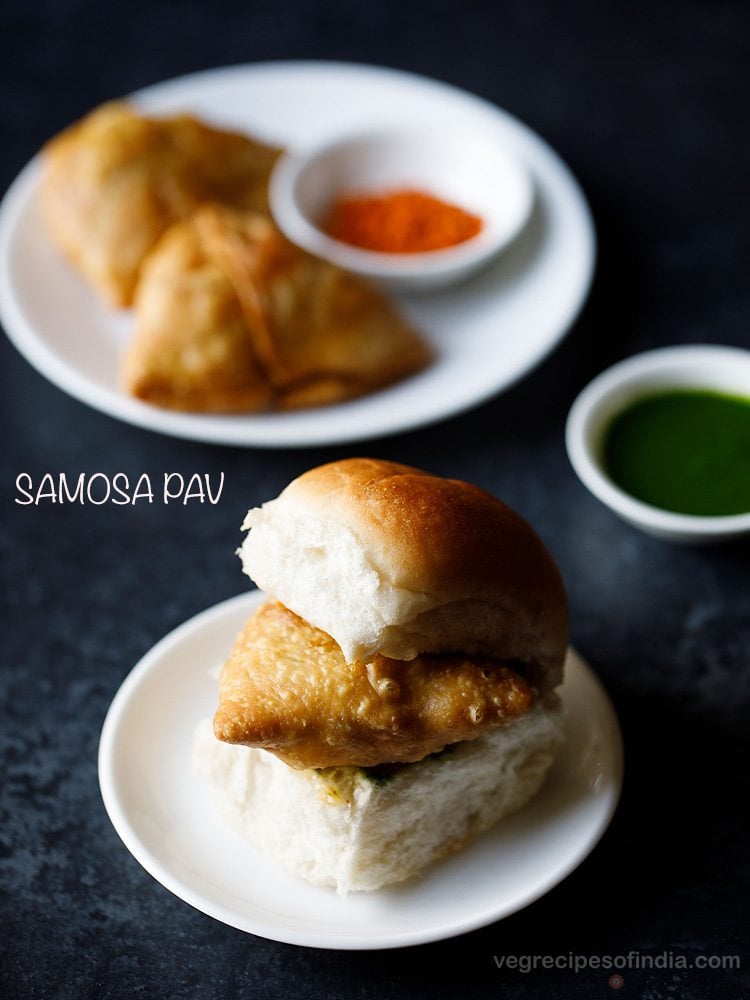
Table of Contents
About Samosa Pav
Like I mentioned in the beginning, Samosa Pav is also one of the most popular street food snacks from Mumbai. I would actually call it as the non-identical twin of the Vada Pav.
Because apart from the stuffing, which is a samosa and an aloo vada respectively, everything else is the same. There’s the pav, the chutneys, the fried green chilies along with them, the deliciousness, the satiating feeling – all at once, in one snack!
Basically, in a Samosa Pav, samosas are stuffed in pav (bread rolls) along with green chutney, sweet tamarind chutney and a dry garlic red chili chutney that is very typical of the Maharashtrian cuisine. So, all you need is just all this to make a Samosa Pav.
Samosa Pav is delicious as well as a filling snack. If you do not have pav, then you can also use burger buns or bread. So, the point is to try and enjoy the flavors of the samosa by turning it into an Indian style slider or sandwich.
Next time, you make samosas at home or get them from your favorite shop, try having it this way.
In this post, I have not shared the entire procedure of making a samosa as then the post would’ve been too lengthy. You can use this recipe of Punjabi Samosa (fried version) or this healthier Baked Samosa as well as the Pav to make the Samosa Pav.
For sweet chutney and green chutney, I’m sharing some of options below:
As I said, you can also use store-bought samosas and pavs to make this Samosa Pav. The green chutney and sweet tamarind chutney can be made a day before.
The sweet chutney can also be purchased from the store. Dry Garlic Chutney can also be made at home, bought from outside or skipped completely.
How to make Samosa Pav
1. Firstly, assemble all the ingredients mentioned below:
- 4 pav
- 4 medium to large samosa
- 1 small bowl green chutney
- 1 small bowl sweet tamarind chutney
- 1 tablespoon dry garlic chutney
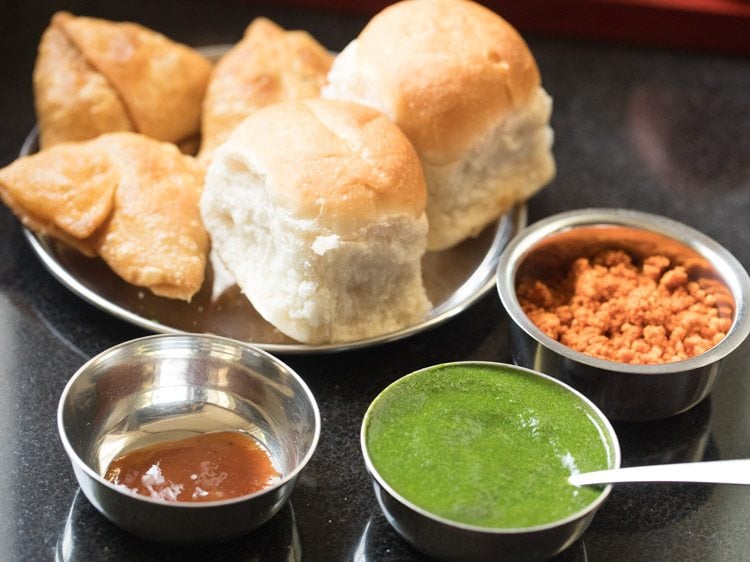
2. Slice the pav in half, without breaking it.
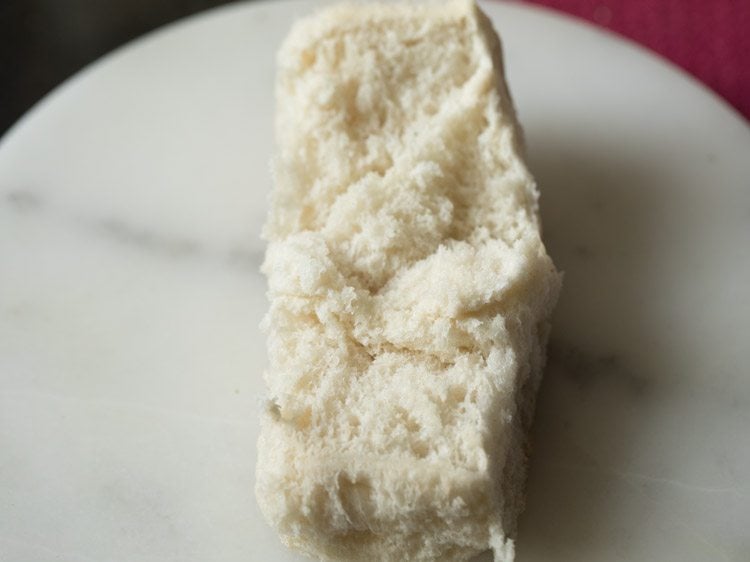
3. Spread some green chutney on both sides as required.
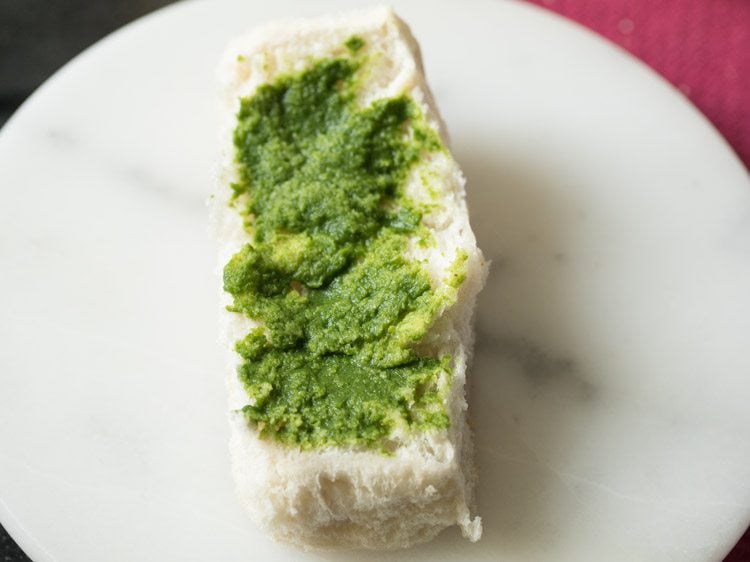
4. Now, spread some sweet tamarind chutney on both sides as required.
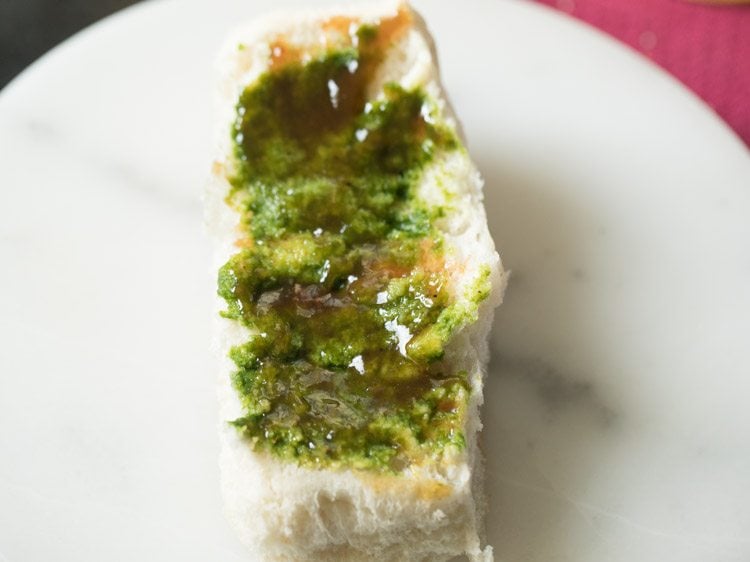
5. Sprinkle some garlic chutney on one side or both sides.
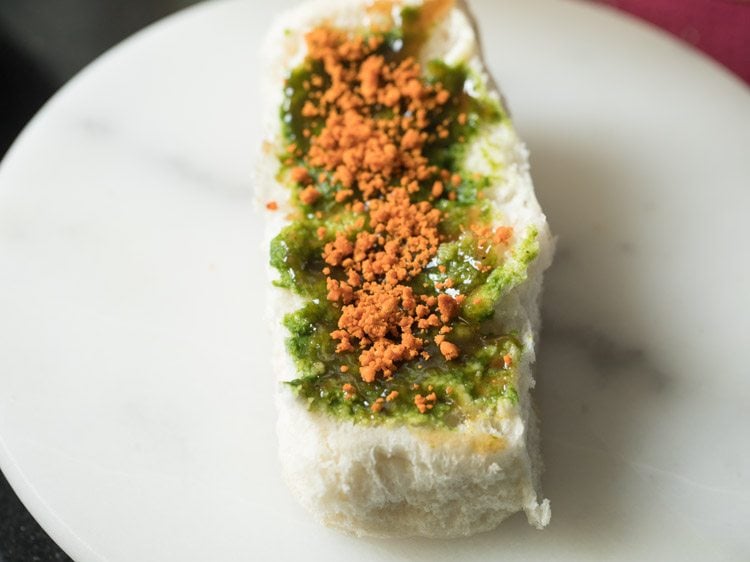
6. Slightly flatten the samosa and place it on the pav.

7. Close the pav and serve Samosa Pav as soon as you make it.
If kept for a long time, then the pav becomes soggy due to the chutneys. While serving, you can serve with a few fried green chilies, green chutney or sweet tamarind chutney.
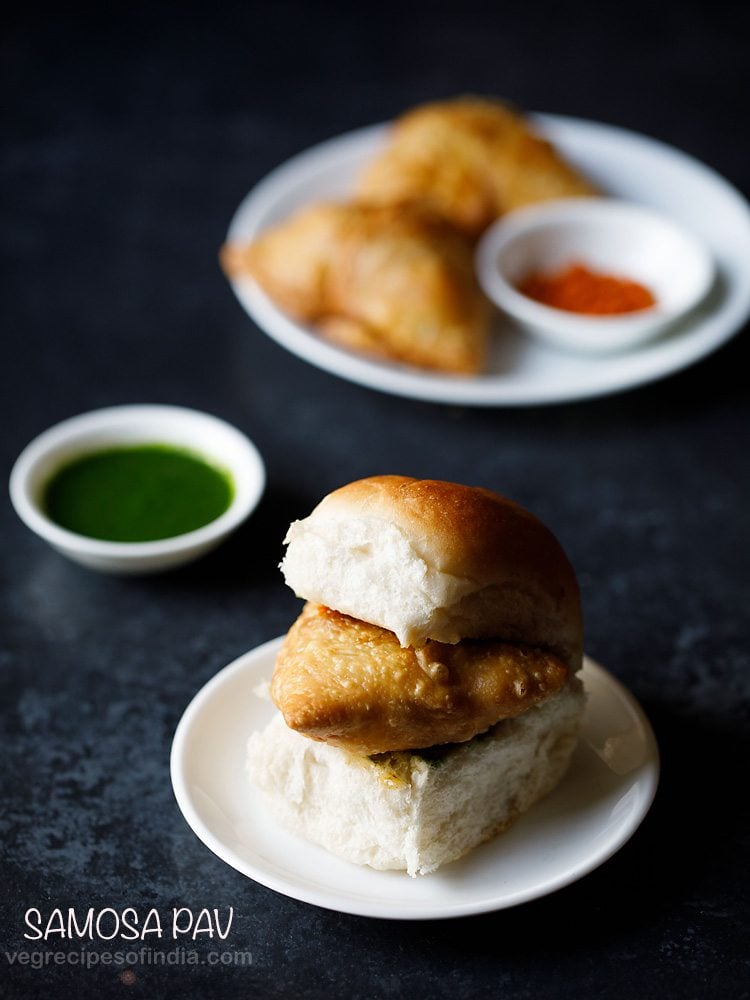
All things pav
A common thing said about Mumbai and its food is, ‘aap Mumbai aaye aur aapne vada pav nahi khaya, toh kya kiya!’ Which literally means that ‘if you came to Mumbai and you didn’t have the vada pav, then you actually didn’t do anything!’ Such is the charm of the vada pav, which is simply Indian style potato sliders and pretty much the lifeline of the ‘city of dreams.’
But when there’s the quintessential Mumbai style vada pav, then can the Samosa Pav be far behind? The answer to this is a big NO! Because just like the elder sibling, the younger sibling or the Samosa Pav is also a much-loved dish here. The street side shops selling a vada or bhajiya pav or samosa vada pav or Samosa Sandwich, by default, also sell a Samosa Pav as well. And it can never be the other way round!
Not just a Samosa Pav, vada pav or other things stuffed inside a pav, these dinner rolls which are locally known as pav are one of the most important forms of bread in this part of the country. Just like there are bhakris and chapatis in the regular diets, pavs are also relished with a lot of everyday sabzi or curry preparations here.
Expert Tips
- You can make this dish with burger buns or bread, instead of pavs or dinner rolls.
- If you don’t want to use the dry garlic chutney, you can skip that too.
- Fried and salted green chilies go really well with this dish. You can serve it alongside.
- It is best to make your own pav, samosa and chutneys at home and use it for this recipe. In case you don’t have the time, then you can use store-bought pav, samosa and chutneys.
- Samosa Pav makes for a filling meal. You can have it as a snack, in breakfast or as brunch.
- For a healthier twist to this recipe, you can use whole wheat pav and baked or air fried whole wheat samosa.
More Street Food Recipes To Try!
Indian Street Food Recipes
Indian Street Food Recipes
Indian Street Food Recipes
Please be sure to rate the recipe in the recipe card or leave a comment below if you have made it. For more vegetarian inspirations, Sign Up for my emails or follow me on Instagram, Youtube, Facebook, Pinterest or Twitter.
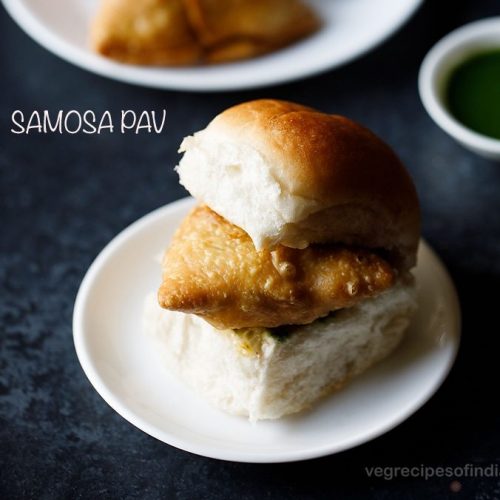
Samosa Pav
Ingredients
- 4 pav or bread rolls
- 4 samosa medium to large-sized
- 1 small bowl Green Chutney
- 1 small bowl tamarind chutney
- 1 tablespoon dry red chilli garlic chutney
Instructions
- Firstly assemble all the ingredients – 4 pav, 4 medium to large samosa, 1 small bowl green chutney, 1 small bowl sweet tamarind chutney and 1 tablespoon dry garlic chutney.
- Slice the pav in half without breaking it.
- Spread some green chutney on both the sides as required.
- Now spread some sweet tamarind chutney on both sides as required.
- Sprinkle some garlic chutney on one side or both sides.
- Slightly flatten the samosa and place it in the pav.
- Close the pav. Serve samosa pav as soon as you assemble them. If kept for a long time, then the pav becomes soggy due to the chutneys. While serving you can serve with a few fried green chilies, green chutney or sweet tamarind chutney.
Notes
- You can opt to make the samosa and the pav at home or purchase them from outside.
Nutrition Info (Approximate Values)
This Samosa Pav Post from the blog archives, first published in Jan 2018 has been republished and updated on December 2022.



